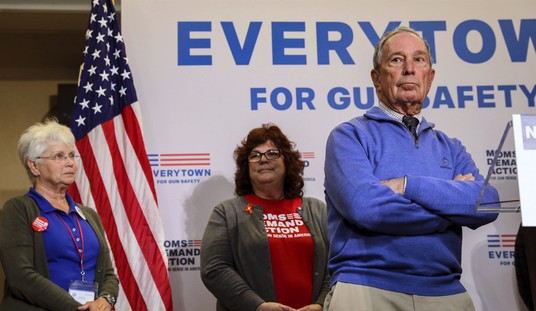College is supposed to be a terrific time. For many, it’s the first taste they get of adulthood. Sure they’re old enough to be considered an adult, but age is just a number in many ways. Actually taking care of yourself? That’s the start of actually being a grown up.
But American colleges tend to be hotbeds for terrible political ideas. Gun control is just one example, but it’s the one we’re going to talk about today.
See, here in Georgia, one of our top colleges is Emory University. It doesn’t get the glory of many other schools–they’re no sports powerhouse–but it’s supposedly one of the best educations you can get here.
The thing is, if this is the best and brightest my state has to offer, well, I apologize on behalf of all Georgians.
I’m talking about an editorial at the student newspaper titled, “Gun control must begin with domestic violence survivors.”
Now, I’m including the title because of the first line of text.
Content Warning: This article contains references to domestic violence.
That’s right, a trigger warning that the content involves something specifically mentioned in the headline.
Folks, it doesn’t get any better.
The Second Amendment, which codifies Americans’ right to bear arms, will not loosen its grasp on American politics any time soon. On Nov. 7, the Supreme Court of the United States finished hearing arguments in the United States v. Rahimi case, which considers whether the Second Amendment should extend to domestic abusers. The plaintiff, Zackey Rahimi, committed a series of shootings after being placed under a domestic violence protective order.
As residents of Georgia — one of the states with the weakest gun legislation in the country — it is our responsibility to advocate for reform. The current debates surrounding gun control are proof that Emory University students must not give up on the fight for gun control, as Georgia is tied with Arkansas, Idaho, Montana and Wyoming for having the second-lowest number of gun safety laws in place. Georgia has expansive protections for gun owners, with laws allowing individuals to respond with “deadly force” to perceived threats, openly carry firearms without any license and purchase guns from unlicensed dealers without background checks. These laws directly enable the possibility of armed, hostile and reckless behavior.
Now, they’re right that Georgia has some of the weakest gun control laws in the country. Those laws aren’t “gun safety” laws, of course, but we know what they’re talking about and they’re trying to use a popular anti-gun spin to present them as less hostile to our rights than they actually are.
As someone who has been a tiny part of the effort to make my state’s gun laws what they are today, let’s understand one important point that the students at Emory missed. That reduction in gun control also coincided with a reduction in the homicide rate.
Georgia is above the national average, sure. However, if reducing gun control leads to an increase in things like homicides, why doesn’t Georgia’s numbers show that? If they “directly enable the possibility of armed, hostile and reckless behavior,” then why hasn’t that showed up in the statistics?
Moving on.
It is clear that the current conservative justices do not care to protect Americans from gun violence. Though the Supreme Court may side with the prosecution and against Rahimi, this decision will not be the win that gun control advocates want. When it comes to guns, conservative justices employ a broken, ambiguous logic that not only strikes down modest firearm regulations but further endangers survivors of domestic abuse.
So much for Emory providing a good education.
If it did, they’d know that the purpose of the Supreme Court isn’t to “protect the American people from gun violence.” It’s to determine the constitutionality of various laws.
It’s up to us to protect ourselves from violence–and that means all violence, not just so-called gun violence.
As for Rahimi, though, it’s too early to tell where the Court will land. However, we need to remember that the issue before the court isn’t whether domestic abusers can and should be able to firearms but whether the restraining order process provides sufficient due process. Rahimi hadn’t been convicted of anything and too many of these same kind or restraining orders are issued without any evidence the person in question is actually dangerous.
The United States experiences more mass shootings than any other developed nation. Since 2006, at least 58% of mass shootings survivors were family members or close acquaintances of the shooter, which demonstrates the profound danger that guns pose to households and relationship dynamics like those in the Rahimi case. Rahimi had initially assaulted his then-girlfriend in a Texas parking lot and quickly turned to shooting his gun when he noticed her trying to escape. This case is further proof that domestic disputes can quickly escalate from arguments to violence. When an average of 70 women are shot and killed in cases of domestic abuse per month, it is vital that guns are taken away from abusers.
And here we go.
Now they’re trying to tie mass shootings in with domestic violence, and there is often some degree of overlap. Parkland, for example, saw a killer who had interacted with police on numerous domestic violence calls be able to lawfully buy a gun because the police had never arrested him.
Yet what they’re trying to present is an argument that mass shooters somehow become mass shooters due to domestic disputes simply because a significant number of survivors are close to the shooters.
Sure, there’s a link, but it’s paywalled for me so I can’t critique the value of the data itself, yet we also know that most mass shooters aren’t spontaneous. Some are, of course, but most plan meticulously. They shoot family members in many cases so that they won’t be left to deal with the aftermath of their actions, not because they’re habitual domestic abusers.
What’s happening here is that they’re twisting things to further push the gun control agenda and trying to do it in new ways. In the process, they’re just embarrassing themselves.








